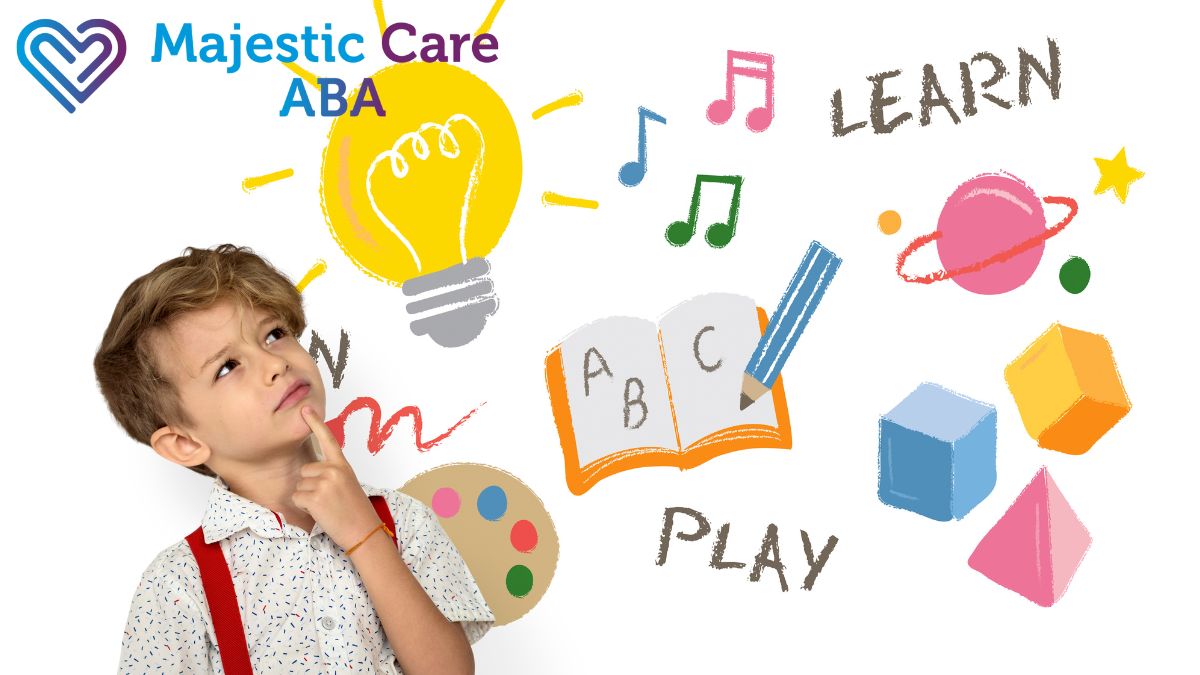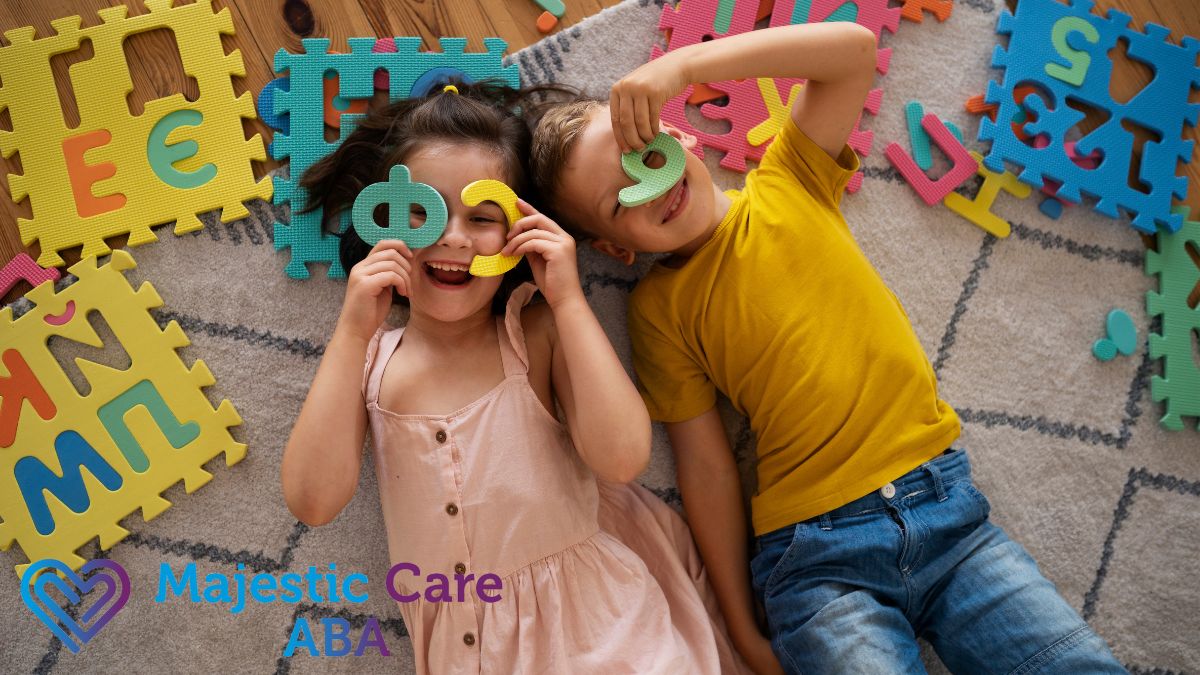The moment your child is diagnosed with autism, a flood of questions comes up. What’s the best next step? Can I help my child reach their full potential? You’re not alone. Research shows early diagnosis and intervention are far more likely to produce long-term benefits in skills and behavior (NICHD – NIH). This is where ABA therapy for kids can make a real difference.
Applied Behavior Analysis (ABA) is the most well-researched method for children with Autism Spectrum Disorder (ASD). It’s a structured behavior therapy program that uses positive reinforcement to teach helpful skills. The goal is simple: give your child the strongest start possible. Because a young child’s brain is still forming, it’s highly “plastic,” meaning it’s more adaptable. Isn’t it exciting to think early, focused support can unlock your child’s potential?
Developmental Milestones: Why Early Support Matters

Early intervention means starting as soon as ASD is diagnosed or strongly suspected, often before age five. Why is timing so critical? The answer is neuroplasticity, the brain’s ability to adapt and change.
Here’s a striking fact: Dr. Ivar Lovaas (1987) found that nearly 47% of children who got intensive ABA therapy (25–40 hours per week) early on were later considered “indistinguishable from peers” in intellectual and educational abilities. Only 2% of the control group achieved this (Lovaas, 1987; McEachin, Smith, & Lovaas, 1993).
More recent studies show similar success. The Early Start Denver Model (ESDM), a naturalistic ABA approach, increased children’s IQ by an average of 15.4 points, compared to just 4.4 points in the comparison group (GlobalRPH). Think of early, intensive therapy as planting seeds during the prime growth season. It builds a strong foundation for hitting developmental milestones.
Top 5 Benefits of Early Intervention ABA Therapy
1. Big Gains in Communication Skills Development
Does your child struggle to speak or understand language? ABA therapy for kids tackles this directly.
- Verbal Language Gains: Intensive ABA programs show real gains in speech and understanding (Autism Speaks). In one study, receptive language skills improved by nearly 18 points in children receiving early intervention versus 10 points in the comparison group (GlobalRPH).
- Functional Communication: ABA teaches alternative skills for challenging behaviors. A child who screams for a toy learns to ask using words, signs, or pictures. This reduces frustration for everyone.
- Non-Verbal Skills: Children learn gestures, eye contact, and reading facial expressions. Imagine your child expressing needs clearly without tantrums. Isn’t that a game-changer?
Real-Life Example:
Jacob, a 4-year-old with autism, learned to use a picture card through ABA therapy for kids to request toys. Within weeks, he used simple words, showed better eye contact, and had fewer tantrums. This functional communication boost increased his confidence and helped him engage positively with family and peers.
2. Boosting Learning and Cognitive Function
Worried about school readiness? Early ABA intervention can help.
- IQ and Cognitive Boost: Children receiving early, intensive ABA often score higher on intellectual measures. In the ESDM study, kids gained more than one standard deviation in IQ (GlobalRPH).
- Focus and Attention: ABA improves attention, memory, and academics by breaking tasks into small, manageable steps. Sitting for a lesson or following instructions becomes easier.
- Generalized Skills: ABA teaches children to apply learned skills across settings, home, clinic, or classroom. This generalization supports lifelong learning.
Real-Life Example:
Lila, a 5-year-old with autism, struggled to focus during math lessons. Through early ABA therapy for kids, her therapist broke counting and number-matching activities into small, manageable steps. Within weeks, Lila completed math exercises with minimal prompts, improved attention, followed instructions consistently, and applied counting skills at home and school, boosting her confidence and classroom readiness.
3. Fostering Independence and Daily Living Skills
Every parent dreams of an independent child. ABA builds independence one skill at a time.
- Self-Help Mastery: ABA teaches life skills like hygiene, fine motor skills, and grooming.
- Sleep and Toileting: Data-driven strategies track successes and accidents, helping parents know when to transition from diapers.
- Long-Term Impact: Skills learned through ABA often last. Many individuals achieve higher employment rates and more fulfilling lives.
- Speech Therapy: Helps improve language, communication, and the ability to express needs clearly.
- Physical Therapy: Strengthens motor skills, balance, and coordination for everyday activities.
- Nutrition Services: Encourages healthy eating habits that support overall development and well-being.
Real-Life Example:
Ethan, a 6-year-old with autism, struggled with dressing and toileting. Through ABA therapy for kids, he learned step-by-step routines for hygiene and self-care. Within weeks, Ethan could dress himself, follow a bedtime routine, and use the bathroom independently, boosting confidence and laying the groundwork for lifelong independence.
4. Reducing Challenging Behaviors and Boosting Social Skills
Do tantrums or frustration disrupt daily life? ABA focuses on replacing problem behaviors with positive alternatives.
- Behavior Reduction: ABA identifies the purpose behind behaviors, then teaches functional replacements (Autism Speaks).
- Social Skills: ABA guides children in turn-taking, sharing, and reading social cues. Even play, like catching a ball, can become a social bridge (Jim Sinclair, 1993).
- Emotional Regulation: ABA teaches coping strategies like breathing exercises or using a quiet space when upset.
Real-Life Example:
Mia, a 4-year-old with autism, often threw toys when frustrated. Through ABA therapy for kids, her therapist taught her to request help using words and practiced turn-taking during ball games. Within weeks, Mia’s tantrums decreased, she shared more easily with peers, and used simple coping strategies to manage emotions.
5. Securing a Brighter, More Accepted Future
Beyond home and school, ABA therapy empowers individuals with autism to thrive in everyday community life:
- Community Acceptance: ABA teaches appropriate public behaviors, shopping, eye contact, and polite language, so adults with autism are welcomed and safe.
- Self-Advocacy through Competence: Through consistent participation in community settings, children communicate “I belong here” and “I am valued” without words (Catherine Maurice, Let Me Hear Your Voice).
- Lasting Gains: Research shows early intensive intervention has effects that persist years later, including intellectual ability, language, and reduced autism symptoms (UW News, 2015).
Real-Life Example:
Ella, a 7-year-old with autism, struggled in public spaces, often avoiding eye contact and interrupting others. Through ABA therapy for kids, she learned polite greetings, waiting in lines, and making eye contact. Over months, Ella became more confident in community settings, demonstrating self-advocacy and social competence while gaining lasting skills.
ABA Therapy in Indiana and ABA Therapy in Colorado: What to Prioritize
Looking for ABA therapy near me in Indiana or Colorado? Location matters less than quality. Focus on these features:
| Feature | Why It Matters |
| High Intensity | 25–40 hours per week for 1–3 years leads to strong long-term results (Autism Speaks). |
| Individualized Plan | One-on-one programs tailored to your child’s strengths and challenges work best. |
| Data Collection | Progress must be tracked constantly to adjust strategies effectively. |
| Family Training | Parents learn how to apply ABA at home, maximizing every opportunity. |
| Focus on Generalization | Skills should transfer to multiple environments through natural environment teaching (NET). |
5 FAQs About Early ABA Therapy

Q1: Will ABA make my child “less autistic”?
A: No! ABA doesn’t suppress personality. It teaches essential skills for independence, communication, and coping, while reducing frustration.
Q2: How does tracking behavior help my child sleep better?
A: Data identifies triggers disrupting sleep. Therapists use this information to create consistent routines and reinforce positive sleep behaviors.
Q3: My child is highly verbal. Will ABA help?
A: Yes! ABA teaches complex social language, like sarcasm, conversation timing, and perspective-taking.
Q4: My child loves trains. Can that help in therapy?
A: Absolutely! ABA uses interests as motivators. Trains can teach sequencing, turn-taking, or reward new communication skills.
Q5: Is ABA only effective for young children?
A: ABA works for all ages. Older children and adults can learn adaptive behaviors, vocational skills, and independent living.
Helping Your Child Thrive with Early Support

Early intervention ABA therapy for kids can make a real difference. At Majestic Care ABA, we tap into the young brain’s natural ability to learn. Our programs focus on building communication, cognition, independence, and social skills. We also replace challenging behaviors with positive alternatives, helping children succeed at home, in school, and in the community.
High-quality, intensive ABA isn’t just about managing a diagnosis; it’s about giving your child the tools to succeed. Starting early provides meaningful early learning support while boosting communication skills development, laying the foundation for confidence and long-term growth.
Families across Colorado and North Carolina have seen how individualized, evidence-based autism therapy for children transforms daily life. Kids gain the ability to express themselves, follow routines, and interact socially.
Reach out to Majestic Care ABA today to explore structured behavior therapy programs that help your child meet developmental milestones and unlock their full potential.


